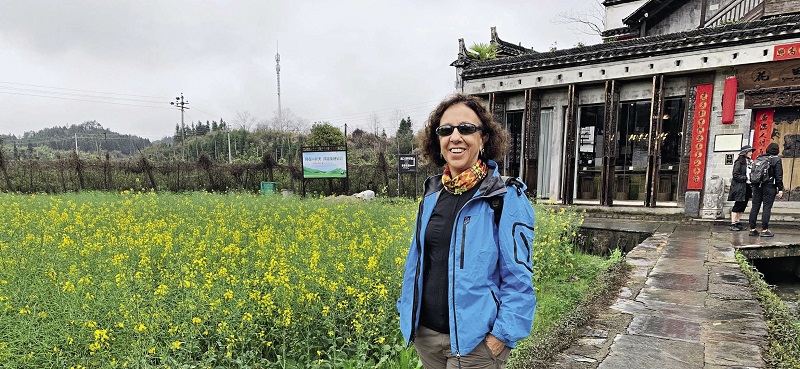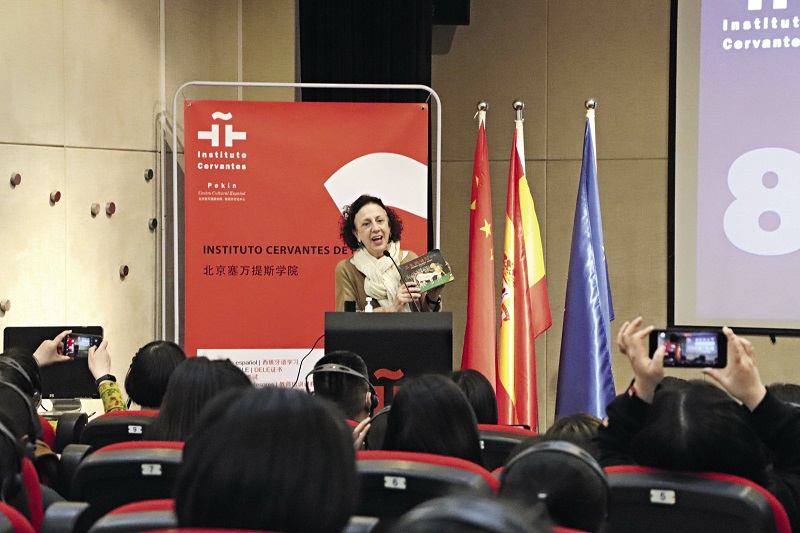Director of the Cervantes Institute of Beijing Isabel Cervera’s Chinese dream.
Director of the Cervantes Institute of Beijing Isabel Cervera’s Chinese dream.
ISABEL Cervera arrived in China’s capital city of Beijing in September 2020 to take the position of director of Instituto Cervantes de Pekin (Cervantes Institute of Beijing), the only official Spanish institution in Beijing offering Spanish lessons for learners at different levels. Amidst the challenging situation caused by the COVID-19 pandemic that has ravaged the whole world, Cervera, along with her team, adapts to the new circumstances on the go.

Isabel Cervera visits a canola field in Wuyuan, Jiangxi Province.
The Cradle for New Ideas
Although it has only been less than a year since Isabel Cervera began working in China at the institute, her relationship with the country dates back much further. In the 1980s, she came to China as a student thanks to a scholarship. During that period she first immersed herself in learning Chinese at Peking University, and then studied calligraphy among other things at the Central Academy of Fine Arts. China was at a crossroads at that time and significant changes were taking place, which is why Cervera still vividly remembers that special time. “When I was a student in China, the people of my generation had many ideas in terms of cultural activities which they wanted to carry out, making the country a great hotbed for experimentation,” said Cervera, and added, “Everything surprised you, everything interested you, and everything seized you, which was also representative of the spirit of the times and our age.”
The two years of her postdoctoral stay in Beijing greatly impacted Cervera’s life and after she finished her studies, she continued coming back to China to conduct research, organize exhibitions, or simply travel. She later went on to become an art historian in Spain. As a professor at the Universidad Autónoma de Madrid, Cervera has devoted much of her professional career to academia and research, and taught courses including History of East Asian Art and History of Chinese Art, among others. She has also conducted research on Buddhism, cultural exchanges through ancient trade routes, and Turpan, an area located in Xinjiang Uygur Autonomous Region of China.
A New Face of the Cervantes Institute of Beijing
Due to the special situation caused by the COVID-19 pandemic, Cervera, who hails from Madrid, began to leverage new online formats to carry out talks, exhibitions, courses, film cycles, and other events.
The Spaniard’s task in promoting Spain and Latin America’s language and culture is no easy job, especially after the important legacy left by Inma González Puy, former director of Instituto Cervantes de Pekin, who now is head of the Miguel de Cervantes Library in Shanghai. “Inma González Puy and I have known each other for a long time in China, so for me it is a pleasure and honor as well as a great challenge to be able to continue her work,” said Cervera. “We find ourselves in an exceptional time of new challenges, in which we must look at everything in a different way,” she said, and added, “Nonetheless, our fundamental task remains the same; we will simply change the form.” Cervera indicated that her two main allies in carrying this mission forward have been the European Union and the Latin American embassies in Beijing, with which they collaborate on an ongoing basis. Apart from these entities, Cervera also wants to bring in new players into the Instituto Cervantes’ network to further strengthen cooperation, such as local institutions, to reach a new and wider audience.
Even though Spanish had a later development in comparison to English in China, it has grown in popularity at a steady pace. Surveys indicate that there are approximately 60,000 Chinese people studying Spanish. This responds, to a large extent, to the economic growth of the last few decades. “I believe the opportunities that the country has offered during the last 25 or 30 years have opened up an infinite world of possibilities to all those people that have grown and studied during this period,” Cervera said. She strives to help Spanish be recognized not only as a language related to culture or tourism, but also as a professional tool and asset. She also feels there are ample prospects for the future in this sense. “Apart from language schools and colleges, there is an entire network of universities which are establishing Spanish departments that will need the right professionals to take up these posts,” she said.
Cervera didn’t mention specific projects in the pipeline for the coming months because the general situation is still volatile and plans could change, but there are several general goals she is pursuing. “We are going to continue with this line-up of lectures and activities called “La ciudad como laboratorio de ideas” (The City As a Laboratory of Ideas), in which we seek to discuss global problems with professionals, first from Spain and China, then expanding to other countries such as Mexico.”

Isabel Cervera at the screening ceremony of Sanmao: la novia del desierto, held at the Cervantes Institute of Beijing on March 15, 2021. Photos courtesy of Isabel Cervera
A Home Away from Home
When Cervera first set foot in China, everything seemed peculiar and different. As time passed, she has gradually discovered an ever increasing number of similarities between her homeland of Spain and China. “Many times I’ve been surprised by the amount of things our two countries have in common, even though we might express them differently or they may take on another appearance,” she said. Cervera thinks the two cultures share some common ground in terms of the value placed on family, interpersonal relationships, and the dinner table. From this perspective, what might have seemed so distant at first glance is actually familiar in essence.
Cervera explains that China has helped broaden her horizons and inspired her with new understandings of many concepts related to work, aesthetics, the artistic world, and value of culture, among others things. The relationships she has forged also take on a particular meaning with regard to her experience with China. “I personally believe that what’s most valuable throughout my stay in China is the people I’ve met during all these years and the ones I’ll continue to meet, all of whom enrich my own vision of the world through their daily life and professional contributions.”
Visiting galleries and museums, going to see historic sites, and wandering aimlessly around the city are some of Isabel Cervera’s favorite pastimes. “Beijing is a huge city with problems and advantages due to its very nature. What brings the city to life is the people who make up the neighborhoods,” she said, and noted, “There is a strong contrast between the general image of the city and the actual everyday life of each individual community, where there are still very endearing scenes of street life.” There is still much to discover in the city for the Spanish and several projects in the works, which is why Cervera is eager to give her best during her remaining years in China to the work of creating bridges between Latin American and Spanish culture and that of China.